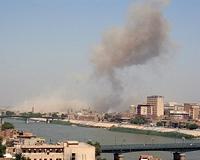 |
Washington (AFP) May 24, 2011 Defense Secretary Robert Gates said Tuesday he hopes Iraqi leaders will ask US troops to stay in their country beyond a year-end deadline but acknowledged the United States was unpopular there. While extending the US military presence beyond this year would send an important message to Arab allies and to Washington's archfoe Iran, Iraqi politicians faced a "challenge" in weighing such a move, Gates said. "We have to realize that it is a political challenge for the Iraqis, because whether we like it or not, we're not very popular there," Gates said at a conference at the American Enterprise Institute, a Washington think tank. Supporters of radical Shiite leader Moqtada al-Sadr "clearly want us out," Gates said, adding that it was unclear "how much of that is the Sadrists and how much of that is the Iranians behind the Sadrists." He expected that "it will take some time for the political leaders to figure out a way to move forward on this. "And all I can say is that from the standpoint of Iraq's future but also our role in the region, I hope they figure out a way to ask. And I think the United States will be willing to say yes when that time comes," he said. Sadr warned last month that his supporters will resume armed opposition if US forces stay in Iraq beyond their scheduled departure at the end of the year. Iraqi Prime Minister Nuri al-Maliki said earlier this month he would meet with rival political blocs to gauge support for keeping American forces in the country, after top US officials visited Baghdad in recent weeks to press Iraq to decide quickly. Gates said keeping a modest US military presence in Iraq would represent a "worthy" investment in a country that could serve as a model for democracy for other Arab states. "Something we could not have predicted five months ago is that Iraq would emerge as the most advanced Arab democracy in the entire region," he said. "I think sustaining that is worthy of an investment" that could in some ways provide "a model, for a multi-sectarian, multi-ethnic society in the Arab world, that shows democracy can work." Keeping a US force in Iraq would send "a powerful signal to the region that we're not leaving," he said. "I think it would be reassuring to the Gulf states, I think it would not be reassuring to Iran, and that's a good thing," Gates added. US forces are largely engaged in "advise and assist" roles with Iraqi security forces since formally ending combat operations last August, when most troops left the country. There are still about 45,000 US soldiers stationed in Iraq, with all American forces due to pull out by the end of 2011 under a security agreement with Baghdad.
Share This Article With Planet Earth
Related Links Iraq: The first technology war of the 21st century
 19 Iraqis, two US troops dead in Baghdad bombs
19 Iraqis, two US troops dead in Baghdad bombsBaghdad (AFP) May 22, 2011 More than a dozen bomb attacks in and around Baghdad on Sunday left at least 19 Iraqis and two American soldiers dead and more than 80 other people wounded. The series of attacks comes just days after blasts against police in a tense northern city killed 29 people, with just months to go before all US forces must withdraw from Iraq amid questions over whether local security forces are up to ... read more |
|
| The content herein, unless otherwise known to be public domain, are Copyright 1995-2010 - SpaceDaily. AFP and UPI Wire Stories are copyright Agence France-Presse and United Press International. ESA Portal Reports are copyright European Space Agency. All NASA sourced material is public domain. Additional copyrights may apply in whole or part to other bona fide parties. Advertising does not imply endorsement,agreement or approval of any opinions, statements or information provided by SpaceDaily on any Web page published or hosted by SpaceDaily. Privacy Statement |